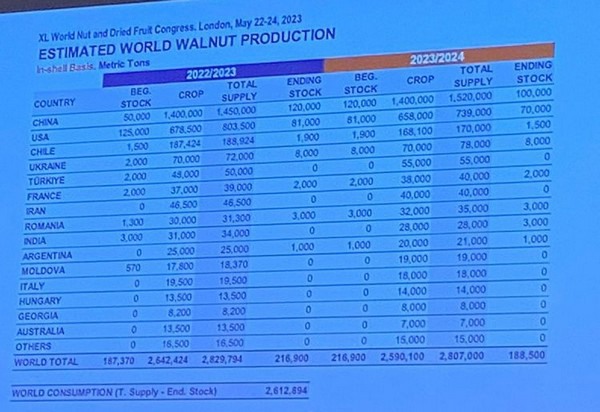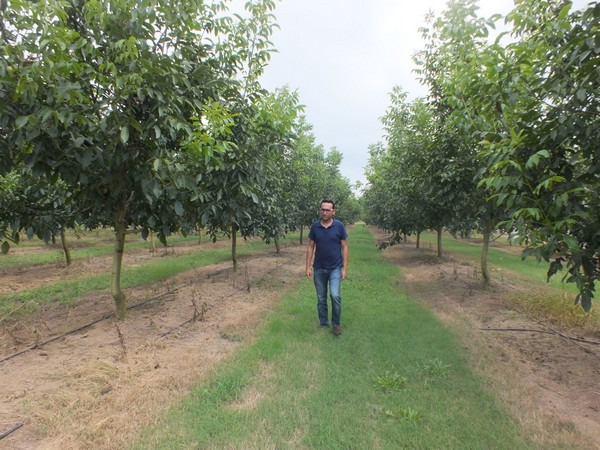Turkey’s walnut production doesn’t come close to covering the consumption, says Cengiz Bostanci, who works for the Turkish Ministry of Agriculture and Forestry, Bartin: “Turkey is one of the gene centres of walnut, but isn’t self-sufficient in production and is one of the countries importing the most walnuts in the world. Walnut production in Turkey is around 50 thousand tons annually and consumption is over 150 thousand tons. Therefore, the walnut production in our country meets even less than one third of the consumption. Turkey imports walnuts from countries such as Chile, USA, Ukraine, Argentina and Australia.”
In terms of issues that restrict production in Turkey, one of them is simply low productivity, Bostanci explains. However, modern gardens are hoping to fix that issue. “The Turkish walnut varieties are early varieties. This means they experience frost problems in some years, which cause the yield to decrease automatically. Especially in large and modern gardens established in recent years, later varieties that are not exposed to cold are used. With these varieties and new modern production techniques, yields close to the world average are obtained. One of the reasons why the production is not sufficient is that the yield is low in the periods when diseases and pests are intense.”

Picture taken of world walnut production during the World Nut and Dried Fruit Congress.
Bostanci says that Turkey is actually a large exporter of walnut seedlings: “Although as a country, we are an importer of walnut fruit, we do export walnut seedlings to hundreds of countries. The walnut seedlings produced in the Bandırma district of Balıkesir in Turkey are sent to 32 countries, including Greece, Bulgaria, Romania, Uzbekistan, Kazakhstan, Portugal and Ukraine. Most of the nearly five million walnut seedlings produced annually are sent for export.”
 “In order to increase the amount of walnut production in our country in line with sustainability criteria by prioritising the environment and human health, studies to increase the yield per hectare are continuing with universities, scientists and local and foreign professionals working in the field. We hope that we will start to see the results of these efforts in the coming years. The European Union on granted protection status to Turkey’s Caglayancerit walnut, which is produced in the country’s quake-hit southeast, in a move that may bring an economic boost to the region.”
“In order to increase the amount of walnut production in our country in line with sustainability criteria by prioritising the environment and human health, studies to increase the yield per hectare are continuing with universities, scientists and local and foreign professionals working in the field. We hope that we will start to see the results of these efforts in the coming years. The European Union on granted protection status to Turkey’s Caglayancerit walnut, which is produced in the country’s quake-hit southeast, in a move that may bring an economic boost to the region.”
“The EU granted the Protected Designation of Origin (PDO) status to the famous walnut, which is named after the region in which it’s produced, by including it in the bloc’s list of more than 1,600 protected products from across the world. The status is based on an EU policy to protect ‘unique characteristics’ of selected products and help their producers to market the products better,” Bostanci concludes.

International Walnut Symposium 2027
The International Walnut Symposium will be held in Turkey for the first time in 2027. At the 9th International Walnut and Pecan Symposium held on June 12-16 in Grenoble, France, South Africa and Turkey competed for the next symposium. It was decided that the symposium, which is held every four years, will be held in Turkey in 2027. South Africa and Turkey were candidates for the next symposium. The presentation made by Okan Gündemir on behalf of Ekiz Fidancılık from Turkey attracted great interest and it was decided to hold the next symposium in Turkey.
Negative effects of climate crisis on walnut
Experts summarized the effects of climate change on walnuts with the following words: "We are starting to see the effects of climate change. First of all, we are reworking cultural practices as we now need to save water in relation to the water needs of the walnut tree, which, like many crops, needs to be irrigated to be able to produce. So we have to work on irrigation management with new tools to stick to the real needs of the tree. Also in orchards, we are working to limit soil evaporation by reworking the grass cover at the base of the trees. Winter and summer temperatures in particular have a strong influence on the tree at the level of flowering and there are imbalances in this regard. This means that pollination is not good and it actually affects production. It is suspected that climate change and especially changes in temperature are causing the emergence of new diseases and especially fungal diseases. Diseases and pests have damaged many more walnut trees in recent years, causing serious losses in production."
For more information:
Cengiz Bostanci
Turkish Ministry of Agriculture and Forestry, Bartin
Tel: +905074300840
Email: tarimbilisim@yahoo.com.tr
